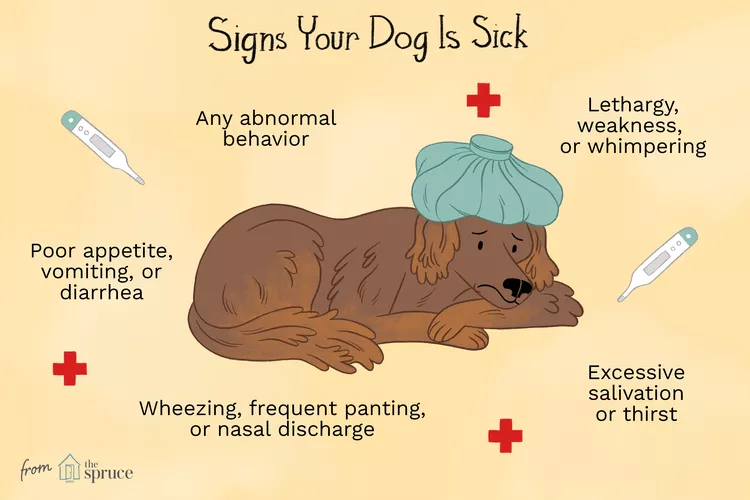Signs Your Dog is Sick and What to Do

The signs your dog is sick may be subtle or vague at first, making them easy to miss. Since your dog can't tell you how they feel in words, you'll need to rely on the signs they show. Here's how to tell if your dog is sick and when it's time to see a veterinarian.
Signs Your Dog Is Sick
Contact your veterinarian for advice if you notice any of the following signs, particularly if they last for more than a day or two:
- Appetite changes
- Bad breath
- Odors from skin or ears
- Weight loss or gain (unintended)
- Lethargy
- Weakness
- Anxiety
- Vomiting
- Diarrhea
- Regurgitation
- Limping or lameness
- Wounds or sores
- Excessive drooling
- Excessive thirst (increased water intake)
- Frequent and/or inappropriate urination
- Constipation
- Incontinence
- Excessive scratching
- Dull, dry, or flaky hair coat
- Panting excessively or frequently for unknown reasons
- Nasal discharge or congestion
- Pain displays, such as whimpering or resistance when a specific area is touched or action is taken
- Dizziness or imbalance
- Circling
- Behavior changes
- Not acting like normal self
You should contact your veterinarian if you notice any signs that you deem abnormal for your dog. It's better to be cautious than to wait. In some cases, your vet may be able to tell you over the phone if something does not need to be addressed right away. In other situations, your vet may advise you to make an appointment or to go to an emergency clinic, depending on the urgency. Above all, follow your vet's advice.
Emergency Signs in Dogs
Immediately go to your veterinarian or an emergency clinic if your dog shows these or any other signs that cause concern:
- Blue or very pale gums
- Labored breathing
- Collapse or loss of consciousness
- Unresponsiveness
- Severe vomiting and/or diarrhea, especially if there is blood in it
- Inability to walk
- Bloated abdomen
- Trying to vomit repeatedly but nothing comes up
- Moderate to severe wounds
- Bleeding that is profuse or won't stop
- Seizures
- Severe pain displays, such as crying out very loudly and excessively, pronounced limping, acting aggressive when touched, or guarding a part of the body intensely
- Body temperature over 104 F or under 99 F (normal is typically 100.5 F to 102.5 F)
- A sudden and extreme change in mental state or cognitive function
- After any kind of trauma such as a big fall, hit-by-car accident, dog fight, or ingestion of any foreign material or toxic foods
How to Tell If Your Dog Is Sick
Sometimes it's difficult to determine if a dog is sick or injured. Dogs often hide signs of illness when they first start to feel unwell. It is believed that they instinctively hide their illness as a form of self-protection (appearing weak would have made them vulnerable in the wild). Also, dogs do not seem to experience some of the emotional effects associated with illness the way humans do (fear of mortality, for example). So, they're more likely to act normally when they feel a little under the weather.
Our dogs cannot communicate with us in words, so we must rely on their actions and attitudes to guide us. You know your dog better than anyone else, so you may be the first to notice that something is wrong. On the other hand, family and friends who do not see your dog every day may notice subtle changes that you missed, such as gradual weight changes.
Body Language
Body language clues are usually subtle, at least at first, but they can give us some information if we pay close attention. A dog in pain may hold their head down, sit in an unusual position, or walk abnormally. The stress of illness may cause dogs to exhibit appeasement gestures, such as yawning or lip-licking.
Behavior Changes
You may notice changes in the way your dog interacts with people, other pets, and toys. A sick dog may avoid social interaction or become easily agitated around others. They may stop playing with toys and lose interest in walks and other activities they once enjoyed. You may also notice they're less responsive to obedience cues than usual, and they may hide or avoid contact and/or affection as well.
Remember, it's always best to contact your veterinarian for advice if you think your dog is sick. Be sure to find the right veterinarian and establish a good relationship with that vet so you are more comfortable calling when something comes up.